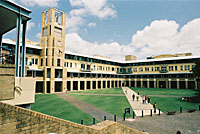|
|||||||||||||||||||||||||||||||||||||||||
| Therapeutics and the Molecular Basis of Disease 1 - PHAR9107 | |||||||||||||||||||||||||||||||||||||||||

Description PLEASE NOTE: This course has had a change of code - up to and including 2009 it was PHPH9107.
This course provides a basis for understanding the mechanisms involved in the disordered physiology that underlies common disease states. The objective is to provide an understanding of those disorders that are amenable to correction or amelioration with drug therapy. It thus provides a rationale for drug design and utilisation. The course consists of four main sections. Section 1 deals with cellular injury and death and covers causes of cell injury, general mechanisms of cell injury and necrosis, apoptosis, stress proteins and cell injury, sub cellular alterations in cell injury, intracellular accumulations, pathological calcification, hyaline change, cellular aging. Section 2 deals with inflammation and repair and covers acute inflammation, chemical mediators of inflammation, chronic inflammation, morphological patterns in acute and chronic inflammation, systemic effects of inflammation, and wound healing. Section 3 covers immunology and diseases of immunity and includes a review of normal immune system mechanisms (cells of the immune system, cytokines, histocompatibility antigens, and hypersensitivity reactions); mechanisms of autoimmune diseases, immunologic deficiency syndromes, and other actual or suspected immune system diseases (e.g. amyloidosis). Section 4 covers oedema, hyperaemia and congestion, haemorrhage, haemostasis and thrombosis, embolism, and shock. Note: The course is elective for programme 9060. |
|||||||||||||||||||||||||||||||||||||||||


